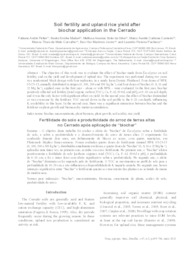Soil fertility and upland rice yield after biochar application in the Cerrado.
Soil fertility and upland rice yield after biochar application in the Cerrado.
Author(s): PETTER, F. A.; MADARI, B. E.; SILVA, M. A. S. da; CARNEIRO, M. A. C.; CARVALHO, M. T. de M.; MARIMON JÚNIOR, B. H.; PACHECO, L. P.
Summary: The objective of this work was to evaluate the effect of biochar made from Eucalyptus on soil fertility, and on the yield and development of upland rice. The experiment was performed during two years in a randomized block design with four replicates, in a sandy loam Dystric Plinthosol. Four doses of NPK 05-25-15, annually distributed in stripes (0, 100, 200 and 300 kg ha-1), and four doses of biochar (0, 8, 16 and 32 Mg ha-1), applied once in the first year - alone or with NPK - were evaluated. In the first year, biochar positively affected soil fertility [total organic carbon (TOC), Ca, P, Al, H+Al, and pH], at 0-10 cm soil depth, and it was the only factor with significant effect on yield. In the second year, the effect of biochar diminished or was overcome by the fertilizer. TOC moved down in the soil profile to the 0-20 cm depth, influencing K availability in this layer. In the second year, there was a significant interaction between biochar and the fertilizer on plant growth and biomass dry matter accumulation.
Publication year: 2012
Types of publication: Journal article
Unit: Embrapa Rice & Beans
Observation
Some of Embrapa's publications are published as ePub files. To read them, use or download one of the following free software options to your computer or mobile device. Android: Google Play Books; IOS: iBooks; Windows and Linux: Calibre.
Access other publications
Access the Agricultural Research Database (BDPA) to consult Embrapa's full library collection and records.
Visit Embrapa Bookstore to purchase books and other publications sold by Embrapa.

